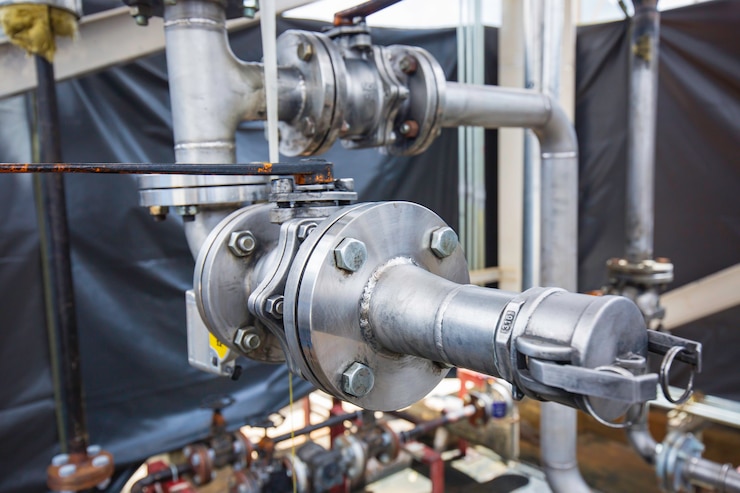Feb 11, 2025
Selecting the right valves for your industrial fluid system is crucial for maintaining efficient operation, safety, and long-term reliability.
Whether you're managing a complex pipeline network, a manufacturing plant, or any other industrial system, the valves you choose play a significant role in controlling the flow of liquids, gases, or steam.
In this article, we'll guide you through the key considerations for selecting the right industry valve for your system.

The first step in selecting the correct valve is understanding the type of fluid being transported and the specific requirements of your system.
Different valves are designed to handle various types of fluids, such as:
Liquids: Water, chemicals, oils, etc.
Gases: Compressed air, natural gas, etc.
Steam: High-pressure or low-pressure steam.
Each fluid has unique characteristics like temperature, pressure, viscosity, and corrosiveness.
For instance, corrosive fluids will require valves made of materials like stainless steel or those that can withstand the chemical properties of the fluid.
Once you understand the fluid type, the next step is determining the type of valve you need.
There are several types of industry valves, each suited for specific functions. Some of the most common types include:
Ball Valves: Ideal for quick shutoff and isolation of fluid. They are commonly used in high-flow applications.
Gate Valves: Best for full flow applications where the valve needs to be either fully open or fully closed.
Globe Valves: Used for regulating flow and controlling pressure in systems.
Check Valves: These prevent backflow in piping systems, ensuring that the fluid flows in one direction only.
Butterfly Valves: Compact and suitable for large-diameter pipes, often used in HVAC and water treatment applications.
The valve type depends on the specific needs of your fluid system. Whether you need precise flow control, pressure relief, or a simple on/off function, there's a valve designed for the task.
Each industry valve comes with a pressure and temperature rating, which indicates the maximum limits it can withstand. It’s essential to match the valve’s ratings with your system’s operational conditions. For example:
High-Temperature Applications: If your system operates in high-temperature environments, such as steam systems or industrial heating processes, select valves that are rated for high temperatures.
High-Pressure Systems: For systems with elevated pressures, such as hydraulic or gas distribution systems, opt for valves designed to handle high-pressure situations.
Using a valve that doesn’t meet these specifications can lead to failures, leaks, or unsafe operating conditions.
The material of the valve is another crucial consideration. Valves are made from various materials, including:
Stainless Steel: Known for its corrosion resistance, ideal for handling corrosive fluids and high-temperature environments.
Brass: Suitable for low-pressure, non-corrosive applications.
Cast Iron: Commonly used in water treatment and lower-pressure systems.
PVC: Ideal for systems handling non-toxic fluids at low pressures and temperatures.
Selecting the appropriate material ensures that the valve will endure the system’s operational conditions without degradation.
In modern industrial applications, many systems require automated control of valves for precise operation.
Automated valves can be controlled remotely, offering greater flexibility, accuracy, and efficiency. When choosing an industry valve, consider whether you need an automated solution, such as:
Electric Actuators: Suitable for applications requiring precise control over flow or pressure.
Pneumatic Actuators: Ideal for systems where air pressure is used to actuate the valve.
Automation can enhance efficiency, reduce human error, and improve safety in critical applications.
The size of the valve and its flow capacity must align with the requirements of your fluid system.
An undersized valve will restrict flow, causing pressure buildup and inefficiency, while an oversized valve may result in poor control and unnecessary costs.
It’s important to calculate the flow requirements of your system and select a valve that matches.
Another key factor is the valve’s ease of maintenance and its expected lifespan. Industrial valves are exposed to harsh conditions, so selecting valves that are durable and easy to maintain can reduce downtime and maintenance costs.
Look for valves that have long service intervals and can be easily repaired or replaced.
Choosing the right industry valve for your fluid system is essential to ensure that your system operates efficiently, safely, and reliably.
By considering factors like fluid type, valve function, pressure and temperature ratings, material, automation, and flow capacity, you can make an informed decision.
Whether you're dealing with a simple or complex system, selecting the correct valve will improve performance, reduce maintenance costs, and enhance safety across the entire system.
If you’re unsure about which valve to choose, don’t hesitate to consult with a professional valve supplier who can offer personalized advice based on your specific needs.
You May Interest In
FOKCA ©1998-2025 All Rights Reserved Sitemap